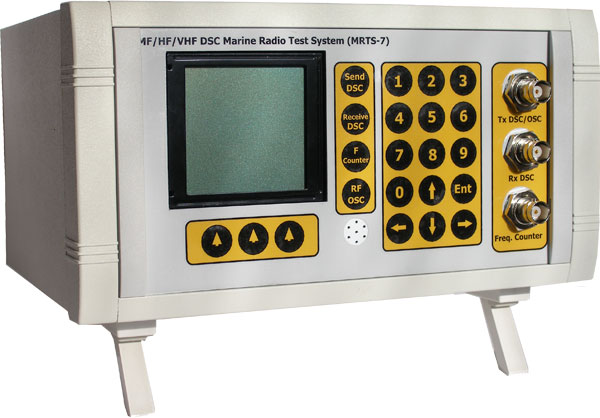|
 The
MF/HF/VHF DSC Marine Radio Test System MRTS-7 (further tester) is
intended to carry out the efficiency, maintenance and servicing tests of
the following equipment (under IMO A.948(23) resolution): The
MF/HF/VHF DSC Marine Radio Test System MRTS-7 (further tester) is
intended to carry out the efficiency, maintenance and servicing tests of
the following equipment (under IMO A.948(23) resolution):
● VHF receiver-transmitters:
- efficiency tests on 6, 13 and 16 channels;
- test of frequency and output power;
● VHF receiver-transmitters with DSC:
- test confirming the correctness of the MMSI code programmed in equipment without any broadcast emission;
- test of correct transmission/reception of DSC messages by means of transmission/ reception of test message;
● MF/HF radiotelephone equipment :
- test of frequency tolerance in range (1600 - 30000) kHz;
- efficiency tests by means of transmission line quality and transmitter output power measurements;
- efficiency test in all frequency range (1600 - 30000) kHz;
● MF/HF DSC controllers:
- test confirming the correctness of the MMSI code programmed in equipment;
- test of presence of emergency signal on MF/HF with DSC by means of transmission of DSC Distress message;
● MF/HF receivers monitoring the DSC:
- efficiency test by means of transmission of test call;
● NAVTEX equipment :
- efficiency test by means of transmission of test message;
● VHF duplex radiotelephony equipment:
- efficiency tests on 6, 13 and 16 channels;
- frequency tolerance test and frequency deviation estimation;
● VHF equipment of duplex radiotelephony with airplanes including operating on 121.5MHz and 123,1MHz:
- frequency and power measurements;
● carried radiophone stations operating in range (300,025-300,225) MHz (intended for river-sea vessels):
- frequency and power measurements.
The
tester is capable to receive the MF/HF/VHF radios emission working in
normal mode without any connections by means of telescopic antenna, and
transmit the DSC message both by means of telescopic antenna and direct
HF cable connection to DSC receiver input.
Besides the tester allows to:
● generate the HF signals in range of 0,5 - 200 MHz;
● measure the signals frequency in range 0,1 - 640 MHz.
The tester is power supplied by external 7-10VDC power supply unit, not less 600mA load current.
Features and main operation modes:
1. "DSC SEND" mode
- GMDSS 'distress signal' on frequencies:
MF - 2187.5 kHz
HF - 4207.5;6312.0;8414.5;12577.0;16804.5 kHz
VHF - 156525 kHz
- Test message to MMSI addressed to a particular MMSI on frequencies
(Individual Call - Safety):
MF - 2187.5 kHz
HF - 4207.5;6312.0;8414.5;12577.0;16804.5 kHz
VHF - 156525 kHz
- TFC on international frequencies
(Individual Call - Routine):
MF - 2177.0;2189.5 kHz
HF - 4219.5;6331.0;8436.5;12657.0;16903.0 kHz
VHF - 156525 kHz
Built-in HF-attenuator allows to measure the receiver sensitivity of checked
station
2. "DSC RECEIVE" mode on following frequencies:
MF - 2187.5;2177.0;2189.5 kHz
HF - 4207.5;6312.0;8414.5;12577.0;16804.5 kHz
4219.5;6331.0;8436.5;12657.0;16903.0 kHz
VHF - 156525 kHz
The
level of received signal is measured and displayed. The DSC message
content can be decoded and viewed on LCD display. All test results can
be stored for further printout or processing by PC.
3. "Frequency meter" mode.
Tester allows to measure the frequencies in range from 100kHz to 1000MHz at signal level of -30dBm/7.07mVrms till 20dBm/Vrms.
4. "LAB" mode
Tester allows to measure the frequency deviation on 6,8,17 VHF channels
Also
tester can be used as HF-oscillator forming the signal in range of
1.5-200MHz with level of40dBuV till 106dBuV (100uV-200mV)
Specification:
Frequency measurements general:
+/-0.2ppm +/-1 digit
Frequency measurements Ch70:
+/-0.2 kHz
Output singnals:
Nominal frequency +/-0.2ppm
Frequency deviation measurements:
+/-0.5kHz (+/-0.1kHz at 5kHz)
Ambient temperature:
0 to 50 Deg.C
Storage temperature:
30- to +60 Deg.C
Weight: 2.5 kg
|
